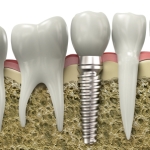
Earlier this month (Dental Elf 13th Feb 2013) we reported on a study looking at whether systemic antibiotics were necessary for the placement of dental implants. That study suggested that antibiotics were not necessary for the placement of single implants. Today we look at another study that looked at the influence of pre-operative antibiotics on various adverse post implant placement outcomes (swelling, bruising, wound dehiscence and suppuration, pain and osseointegration).
Adult patients on waiting list for implant placement were randomised to antibiotic (test group, n=27) or placebo (control group, n= 28). The test group received 3 g amoxicillin one hour pre-operatively, the controls ) received placebo capsules 1 h pre-operatively. No post-operative antibiotics were prescribed. Pain diaries and interference with daily activities diaries were kept by the patients for 1 week post-operatively. Signs of post-operative morbidity (swelling, bruising, suppuration and wound dehiscence) were recorded by the principal investigators at day 2 and day 7 following the operation. Osseointegration was assessed at 2nd stage surgery or 3–4 months post-operatively.
- There were 5 implant failures in 5 patients in the placebo group give an implant survival of 82% compared with 100% in the test group( P = 0.0515).
- No significant differences were found for most of the signs of post-operative morbidity at 2 and7 days post-operatively.
- Only bruising at 2 days following the operation appeared to be higher in the placebo group (P = 0.0511).
- Post-operative pain (P = 0.01) and interference with daily activities (P = 0.01) appeared to be significantly lower for the antibiotic group after 7 days.
The authors concluded
The use of for dental implant surgery may be justified, as it appears to improve implant survival in the short term and also results in less post-operative pain and interference with daily activities. From the results of this study, it appears that prophylactic antibiotics may also be beneficial both in terms of implant survival, especially when the surgical procedure is prolonged due to its difficulty, high number of implants placed or operator’s inexperience.
Comment
In comparison with the study by Tan et al (Dental Elf 13th Feb 2013) this study used a range of implant systems rather than a one particular type. The authors of this study also note that there was an association between longer duration of surgery and post-operative pain and interference with daily activities. The authors also note that the findings of this study are similar to those of the 2010 Cochrane review which included 4 trials ( See Dental Elf 13th Feb 2013).
Links
Nolan R, Kemmoona M, Polyzois I, Claffey N. The influence of prophylactic antibiotic administration on post-operative morbidity in dental implant surgery. A prospective double blind randomized controlled clinical trial. Clin Oral Implants Res. 2013 Feb 13. doi: 10.1111/clr.12124. [Epub ahead of print] PubMed PMID: 23406290.

[…] Dental Elf 26th Feb 2013 – Study suggests that pre-operative antibiotics have positive i… […]